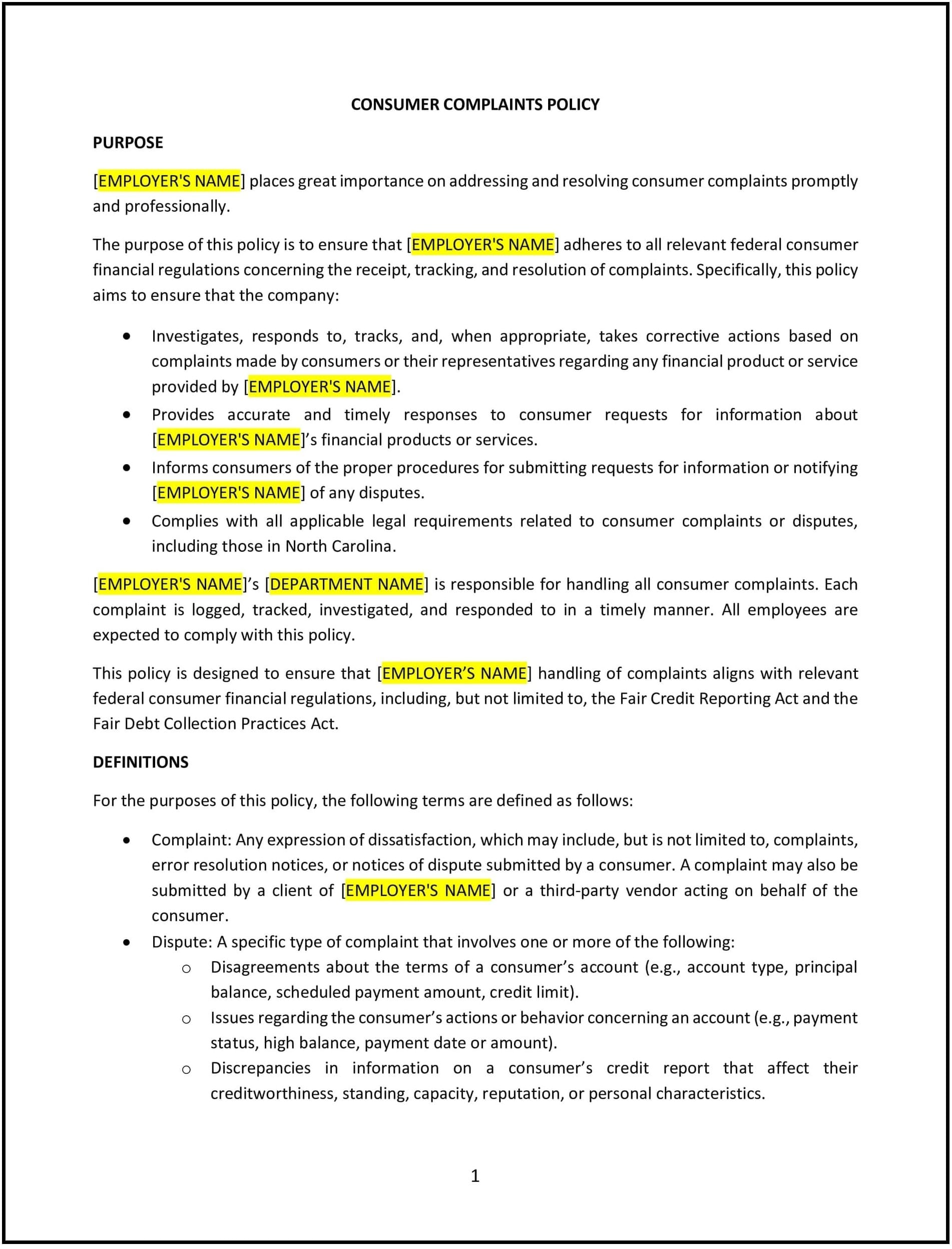Consumer complaints policy (North Carolina): Free template
Got contracts to review? While you're here for policies, let Cobrief make contract review effortless—start your free review now.

Customize this template for free
Consumer complaints policy (North Carolina)
A consumer complaints policy helps North Carolina businesses address and resolve complaints from customers or clients in a fair and timely manner. This policy outlines the steps for submitting complaints, the procedures for investigating and resolving them, and the company’s commitment to customer satisfaction and continuous improvement.
By adopting this policy, businesses can ensure that customer concerns are heard, address issues effectively, and maintain positive relationships with their clients and customers.
How to use this consumer complaints policy (North Carolina)
- Define the types of complaints: Specify the types of consumer complaints that can be submitted, such as product issues, service problems, billing disputes, or concerns about employee behavior.
- Set clear procedures for submitting complaints: Provide instructions for customers on how to submit complaints, including whether they should use an online form, email, phone call, or in-person submission.
- Set timeframes for resolution: Define how quickly complaints should be acknowledged and resolved, specifying the timeline for responding to and addressing complaints.
- Outline the investigation process: Explain how complaints will be investigated, including how customer concerns will be reviewed, evidence will be gathered, and potential solutions will be proposed.
- Address follow-up actions: Specify how the company will follow up with customers to ensure satisfaction after a complaint is resolved and how feedback will be used for continuous improvement.
- Reflect North Carolina-specific considerations: Ensure the policy aligns with North Carolina’s consumer protection laws, including any state-specific regulations related to complaints, refunds, and customer satisfaction.
Benefits of using this consumer complaints policy (North Carolina)
This policy provides several benefits for North Carolina businesses:
- Enhances customer satisfaction: A clear process for resolving complaints ensures that customers feel valued and that their concerns are taken seriously.
- Builds customer loyalty: By addressing complaints promptly and professionally, businesses can foster long-term customer relationships and retain loyal clients.
- Improves brand reputation: A commitment to resolving consumer complaints demonstrates the business’s dedication to customer service, improving its reputation in the marketplace.
- Identifies areas for improvement: Customer complaints can reveal operational or product issues that need attention, helping the business improve and innovate.
- Complies with consumer protection laws: The policy ensures that the business adheres to North Carolina’s consumer protection laws and provides a clear framework for addressing customer grievances.
Tips for using this consumer complaints policy (North Carolina)
- Communicate the policy clearly: Ensure that customers are aware of how to submit complaints and the process for resolution. Make the policy accessible on the company’s website and at points of customer contact.
- Train staff: Provide training to employees on how to handle customer complaints professionally and effectively, ensuring that they follow the company’s guidelines for resolving issues.
- Track complaints: Keep records of customer complaints to identify patterns, monitor progress, and ensure timely resolution.
- Follow up with customers: After resolving a complaint, follow up with the customer to ensure they are satisfied with the outcome and to gather feedback for future improvements.
- Review the policy regularly: Periodically review the policy to ensure it complies with North Carolina’s consumer protection laws and reflects changes in business operations or customer expectations.